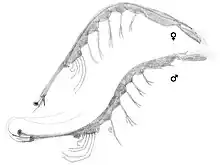Lucifer (crustacean)
Lucifer is a little-known and degenerate genus of prawns, the type genus of the family Luciferidae.[2] Lucifer has a long body, but many fewer appendages than other prawns, with only three pairs of pereiopods remaining, all without claws. It also bears no gills.[3] The females, uniquely among prawns, carry the fertilised eggs on her pleopods until they are ready to hatch. This parallels the development of a similar system in pleocyemates, although the attachment is less strong in Lucifer.[3] The length of the eye-stalks and the form of the petasma are used in distinguishing the eight species from each other.
| Lucifer | |
|---|---|
 | |
| Lucifer typus | |
| Scientific classification | |
| Domain: | Eukaryota |
| Kingdom: | Animalia |
| Phylum: | Arthropoda |
| Class: | Malacostraca |
| Order: | Decapoda |
| Suborder: | Dendrobranchiata |
| Family: | Luciferidae |
| Genus: | Lucifer J. V. Thompson, 1829 |
| Type species | |
| Lucifer typus H. Milne-Edwards, 1837 | |
| Synonyms [1] | |
|
Leucifer | |
The name Lucifer is Latin for "light bearer" was given to the genus because of these prawns' bioluminescence.[4]
Two species are recognised:
- Lucifer orientalis Hansen, 1919
- Lucifer typus H. Milne-Edwards, 1837
Five nominal Lucifer species (L. chacei, L. faxoni, L. hanseni, L. intermedius, and L. penicillifer) have been reclassified in a distinct genus, Belzebub.[4]
References
- Thomas E. Bowman & Lipke B. Holthuis (1968). "Lucifer or Leucifer: which spelling is correct?" (PDF). Crustaceana. 14 (2): 216–217. doi:10.1163/156854068x00638.
- Sammy De Grave; N. Dean Pentcheff; Shane T. Ahyong; et al. (2009). "A classification of living and fossil genera of decapod crustaceans" (PDF). Raffles Bulletin of Zoology. Suppl. 21: 1–109. Archived from the original (PDF) on 2011-06-06.
- Gary C. B. Poore & Shane T. Ahyong (2004). Marine decapod Crustacea of southern Australia: a guide to identification. CSIRO Publishing. ISBN 978-0-643-06906-0.
- Alexander L. Vereshchaka; Jørgen Olesen; Anastasia A. Lunina (2016). "A phylogeny-based revision of the family Luciferidae (Crustacea: Decapoda)". Zoological Journal of the Linnean Society. 178: 15–32. doi:10.1111/zoj.12398.